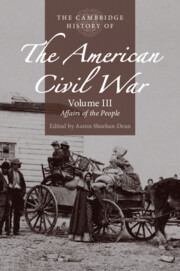Book contents
- The Cambridge History of the American Civil War
- The Cambridge History of the American Civil War
- The Cambridge History of the American Civil War
- Copyright page
- Contents
- Plates
- Figures
- Contributors to Volume III
- Note on the Text
- Part I Values
- Part II Social Experience
- 6 Families in the Civil War
- 7 Refugees and Movement in the Civil War
- 8 Citizen Soldiers
- 9 Immigrant America and the Civil War
- 10 Emancipation and War
- 11 The Black Military Experience
- 12 Motives and Morale
- 13 Urban and Rural America in the Civil War
- Part III Outcomes
- Index
- Plate Section (PDF Only)
- References
7 - Refugees and Movement in the Civil War
from Part II - Social Experience
Published online by Cambridge University Press: 11 October 2019
- The Cambridge History of the American Civil War
- The Cambridge History of the American Civil War
- The Cambridge History of the American Civil War
- Copyright page
- Contents
- Plates
- Figures
- Contributors to Volume III
- Note on the Text
- Part I Values
- Part II Social Experience
- 6 Families in the Civil War
- 7 Refugees and Movement in the Civil War
- 8 Citizen Soldiers
- 9 Immigrant America and the Civil War
- 10 Emancipation and War
- 11 The Black Military Experience
- 12 Motives and Morale
- 13 Urban and Rural America in the Civil War
- Part III Outcomes
- Index
- Plate Section (PDF Only)
- References
Summary
The Civil War generated mass migrations across the Confederacy and the Border South. Called by many names – refugees, contrabands, fugitives, buffaloes – civilians took to the road, hoping variously to find sanctuary, escape persecution, or secure freedom. The panoply of terms used to describe dislocated civilians reflected the diversity of their experiences: refugee planters and runaway slaves both fled the plantation but for radically different reasons and under different conditions. For the most part, historians have replicated this linguistic segmentation of Civil War refugees in their scholarship. Mary Elizabeth Massey’s 1964 Refugee Life in the Confederacy, for instance, focused almost exclusively on pro-Confederate white civilians who left home to find refuge within the shrinking bounds of the Confederacy. More recently, a number of historians have examined the approximately 500,000 African Americans who fled slavery during the Civil War. Since 1976, the Freedmen and Southern Society Project at the University of Maryland has published a series of volumes drawn from National Archives collections documenting the black refugee experience.
- Type
- Chapter
- Information
- The Cambridge History of the American Civil War , pp. 131 - 150Publisher: Cambridge University PressPrint publication year: 2019

